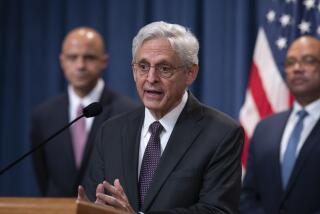Op-Ed: Now we know for sure: The Russia story is not a ‘hoax’
- Share via
We can expect a series of after-shocks and collateral revelations from Friday’s indictment of 13 Russian nationals and three Russian organizations for meddling in the 2016 election. But let’s first take in the epicenter: We now know without a doubt that Russians conducted a multimillion-dollar, highly sophisticated campaign to destabilize the American political system. Has there been a sharper or more serious attack on the United States since 9/11?
The effort spanned years; foreigners posed as Americans and stole identities; they manipulated social media platforms to sow discord.
A pernicious assault on U.S. free elections has been uncovered.
Undoubtedly, the indictments are a vindication for Special Counsel Robert Mueller’s probe, and should put to rest the suggestion that he has been engaging in, as President Trump recently tweeted, a “witch hunt.” Until Friday, the president had repeatedly insisted that Russia had not interfered with the election and even called that notion a “hoax.” So much for that argument.
Mueller stepped into the breach that the administration and Congress created with over a year of dithering and insouciance at the notion of Russian interference. Their inaction and subject-changing have been shameful, and it’s a huge lucky break for the nation that Mueller was able to soldier through a torrent of unwarranted criticism.
A victory lap is also in order for Deputy Atty. Gen. Rod Rosenstein, who signaled the importance of the indictments with a rare news conference on Friday afternoon. Trump has made Rosenstein an even bigger whipping boy than Mueller in some ways, and has openly threatened to discharge him. Friday’s indictments should blunt if not silence those discreditable attacks.
But immediately and predictably, the president found a way to deflect the charges.
“Russia started their anti-US campaign in 2014,” he tweeted, “long before I announced that I would run for President. The results of the election were not impacted. The Trump campaign did nothing wrong — no collusion!”
Now he admits there was in fact an anti-U.S. campaign? That’s progress, of a sort. The other comments are bogus. Mueller and the intelligence establishment have never said, because they could not possibly know, whether Russian interference swung the election.
In fact, given the closeness of the election and the apparent targeting by Russians of the most closely fought districts, whether “the results of the election were impacted” is a historic imponderable that political scientists and bar-goers will debate without resolution for years.
And there certainly was concerted action, possibly “collusion,” although Friday’s indictment spoke only of “unwitting” relationships between Russian nationals and Trump staffers.
Besides, there’s surely more to come. The safe bet is that we know only a fraction, perhaps a very small fraction, of what Mueller has uncovered. It is often best prosecutorial practice — and Mueller embodies best prosecutorial practice — to tell a skeletal story in an indictment and retain juicy details for future use.
What might happen next?
Friday’s news put added pressure on Rick Gates, a staffer for Trump’s 2016 campaign, who is said to be in the final stages of negotiating a plea deal with Mueller. Gates, along with former campaign manager Paul Manafort, may have known about official or semi-official contacts with Russian agents, or about financial high jinks between the Trump Organization and Russia dating back many years.
Any cooperation deal between Gates and Mueller will require Gates to divulge everything he knows on these topics. And the fact that he can’t be certain what else Mueller has figured out means he’d better be certain not to hold anything back.
The indictments will also change the dynamic for Trump’s son-in-law, Jared Kushner, and his son Donald Jr., who have long and loudly insisted that “there’s nothing to see here.” They can no longer blithely dismiss the topic of Russian interference as inconsequential.
A pernicious assault on U.S. free elections has been uncovered. Will the political leadership of the country wake up and address the threat, armed with the knowledge that Mueller has developed? Nobody rational can still doubt the gravity of the attacks and the imperative of putting aside political partisanship to address them.
Harry Litman, a former U.S. attorney and deputy assistant attorney general, teaches at the UC San Diego school of political science and practices law at Constantine Cannon. @harrylitman
Follow the Opinion section on Twitter @latimesopinion or Facebook
More to Read
A cure for the common opinion
Get thought-provoking perspectives with our weekly newsletter.
You may occasionally receive promotional content from the Los Angeles Times.






